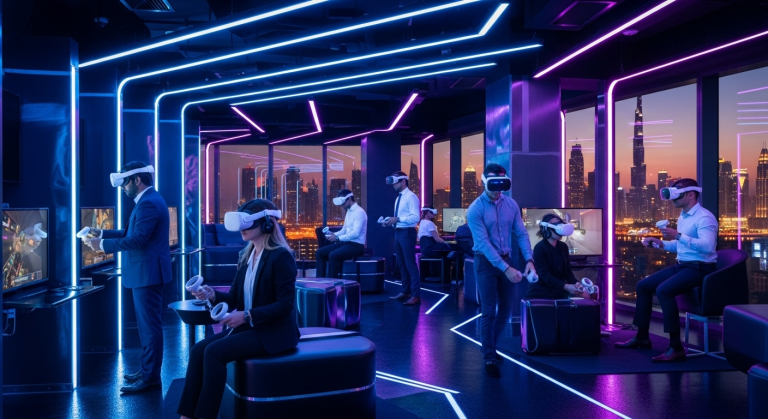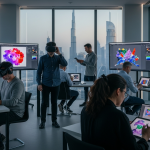Market Analysis and Opportunities
The United Arab Emirates (UAE), particularly Dubai, is rapidly evolving into a prime destination for innovative entertainment businesses, making it an exceptional ground for launching a Virtual Reality (VR) arcade for gaming. Fueled by a young, tech-savvy population, robust tourism, and a commitment to digital transformation, the demand for immersive gaming experiences is growing exponentially. In this in-depth analysis, we examine the market dynamics, consumer behaviors, and strategic opportunities for establishing a successful VR arcade business in Dubai.
Target Market Analysis
- Market Size and Growth Rate: The UAE’s gaming market is thriving, with Dubai at its heart. Statista projects the UAE video game market to reach USD 367 million in 2024 and forecasts 6% CAGR through 2028. The VR segment is growing even faster, with the Middle East and Africa VR market expected to achieve a CAGR above 30% through 2027 (TechSci Research).
- Key Consumer Segments: Primary audiences include Gen Z and millennials, tech enthusiasts, tourists, and families. Dubai’s large expatriate community and international visitors further diversify the target base.
- Consumer Behavior: There is a distinct preference for experiential, group-based, and exclusive gaming options. High disposable incomes, tourism-driven demand, and increasing interest in technology-driven leisure activities drive recurring revenues.
- Industry Trends:
- Adoption of immersive experiences: Strong interest in AR/VR, eSports, and gamification.
- Digital integration: Online booking, cashless payments, and loyalty apps are now expected standards.
- Sustainability and eco-friendly operations: Green energy and efficient resource use resonate with Dubai’s Vision 2030.
Marketing Needs and Recommendations
- Robust market research: Deep dive into local demographics, competitor benchmarking, and regular customer feedback are foundational before launch.
- Digital marketing: SEO-optimized website, pay-per-click (PPC) campaigns, and targeted social media ads (Instagram, TikTok, YouTube) tailored to UAE and GCC audiences.
- Branding and positioning: Develop a recognizable, tech-forward visual identity and engaging brand story. Partnership with influencers and gaming personalities can enhance credibility.
- Offline engagement: Leverage Dubai’s thriving events sector—pop-up booths at malls, gaming expos, and corporate partnerships increase local exposure.
Expansion Potential
- Segment Diversification: Beyond walk-in gaming, opportunities include:
- Corporate team-building packages
- School educational programs integrating VR learning
- Franchise models across other emirates or GCC countries
- Mobile VR setups for events and rentals
- Regional Growth: Success in Dubai can serve as a springboard for entry into Abu Dhabi, Sharjah, or Saudi Arabia, which are experiencing similar demand surges for entertainment tech.
Comprehensive Business Overview
A Virtual Reality arcade for gaming is a physical gaming center equipped with cutting-edge VR hardware, software, and peripherals, offering immersive game experiences, simulations, and eSports competitions.
Industry: The business exists at the intersection of the gaming, technology, and entertainment industries in Dubai, leveraging the city’s international appeal and innovation-driven policies.
Business Model:
- Pay-per-session
- Membership subscriptions
- Event hosting
- Corporate and educational packages
Target Audience: Young adults (ages 15-35), families, tourists, tech enthusiasts, corporate clients.
Operational Scope:
– Location: Best suited for high-traffic areas like Dubai Marina, City Walk, or large malls. Dubai Free Zone locations such as Dubai Silicon Oasis or Dubai Internet City offer ease of setup and foreign ownership.
– Stage: Most VR arcades in Dubai are in the startup or early growth phase, leaving ample room for innovation and differentiation.
Mission: Deliver the most immersive and memorable VR gaming experience in the UAE.
Vision: To become the premier destination for technology-driven entertainment in the GCC.
Core Objectives:
- Continually update technology and game offerings
- Deliver world-class service and experiences
- Drive repeat business through memberships and events
- Maintain regulatory and operational excellence
Competitive Advantage
Unique Value Proposition and Key Strengths
- Entrepreneur Perspective:
- First-mover advantage in a nascent but expanding market
- Access to Dubai’s thriving tourist and expatriate base
- Operational flexibility via Free Zone business setup (Business Setup Services)
- Ability to source global VR technology through Dubai’s international trade links
- Investor Perspective:
- Scalable model with opportunities for franchising and diversification
- High gross margins and recurring revenue streams
- Strong projected demand and rapid adoption of VR
- Eligibility for government grants and incentives (e.g., Dubai Future Foundation support)
- Manager Perspective:
- Centralized operations, standardized technology, and robust SOPs enable streamlined management
- Data-driven customer loyalty programs and digital marketing enhance retention
- Opportunities for exclusive partnerships with international game developers or hardware providers
Financial and Investment Needs
Financial Requirements
- Initial Capital Needs: Startup costs typically range from AED 1.3 million to AED 2.5 million for a 200 sqm arcade, including:
- VR equipment and peripherals: AED 600,000–1,000,000
- Leasehold improvements: AED 250,000–500,000
- Licensing and permits: AED 30,000–50,000
- Staffing: AED 150,000–300,000 (annual)
- Marketing and R&D: AED 100,000–200,000
- Ongoing Expenses: Rent, utilities, hardware maintenance, payroll, continued marketing, and insurance.
Investment Potential
- Expected ROI typically ranges from 20–30% within 3 years, depending on market penetration and operational efficiency.
- High demand, scalability, and recurring revenue models make the business attractive for venture capital, equity investments, or limited partnerships.
- Joint ventures with local partners can provide additional market access.
Financial Risks and Mitigation
- High initial setup and running costs. Mitigation: phased rollouts, lease negotiations, and equipment leasing.
- Cash flow volatility due to seasonality or economic shocks. Mitigation: Diversify revenue streams—corporate, schools, and events.
- Currency exposure. Mitigation: Price in AED, use forward contracts where necessary.
- Asset depreciation due to rapid tech change. Mitigation: Regularly refresh hardware and invest in upgradable systems.
- Insurance and Legal: Comprehensive business insurance, legal reviews, and the use of Investment Consulting Services safeguard against potential losses.
Human Resources and Recruitment
Workforce Needs
- Estimated staff for a standard VR arcade: 8–12 employees
- Manager (operations, HR, finance)
- Gaming attendants/technicians
- Marketing and sales executives
- IT support/developers (for technical troubleshooting and content updates)
- Key Skills: Customer service, technical know-how (VR, AR), sales acumen, digital marketing, project management
- Employment Types: Permanent for core team, part-time or temporary for events and peak times
HR Challenges and Solutions
- Intense competition for skilled UAE-based tech staff. Solution: Competitive salary and benefit packages, training and development programs, career progression pathways.
- Cultural and language diversity. Solution: Hire multilingual staff, offer cross-cultural sensitivity training.
- Talent retention. Solution: Performance incentives, work-life balance schemes, and employee engagement activities.
Compliance with UAE Labor Laws
- Strict adherence to UAE labor law—employment contracts, visa sponsorship, insurance, and end-of-service gratuity.
- Transparent onboarding processes and regular compliance audits (can be supported through HR outsourcing or compliance services).
Infrastructure and Operations
Infrastructure Needs
- Physical arcade location in a prominent Dubai retail or entertainment district; co-working spaces for support staff if necessary.
- VR headsets, motion platforms, high-end gaming PCs and peripherals, AI-driven queue management and booking systems.
- Reliable, high-bandwidth internet connectivity and on-site or cloud-based data storage.
Cost-Effective Solutions
- Consider Free Zone locations for tax advantages and lower setup costs.
- Lease VR equipment to reduce up-front capital requirements.
Operational Optimization
- Implement ERP or POS software for real-time analytics, inventory, and staff management.
- Adopt lean management principles and regularly review processes for improvement.
- Automate bookings and integrate loyalty/reward systems online.
Legal Compliance
- Company registration with DED or Free Zone authority.
- Obtain gaming and entertainment activity licenses.
- Open a corporate bank account (often facilitated by Free Zone setup).
- Ensure intellectual property rights for proprietary VR content and proper commercial agreements with global tech suppliers.
Innovation and Technology
- Continuous integration of emerging VR/AR platforms.
- Explore AI-powered customer service (e.g., chatbots, recommendation engines).
- Adopt green technologies: energy-efficient systems, recycling, and eco-friendly materials to align with Dubai’s sustainability vision.
Marketing and Branding Strategies
Brand Status and Perception
- Current VR arcades have modest brand visibility; the market awaits a dominant, iconic brand with strong recall.
- Visual identity should project innovation, fun, safety, and inclusivity.
- Consistent messaging across physical and digital domains builds trust, especially for a multicultural, family-oriented audience.
Marketing Channels and Optimization
- Digital presence: SEO-optimized website, active presence on UAE-centric social platforms, and influencer partnerships.
- Traditional channels: In-mall displays, radio, and print in tourism/entertainment magazines.
- Event-driven marketing: VR tournaments, school partnerships, and tie-ins with Dubai’s extensive events calendar.
- Leverage Sales and Advertising Services for multi-channel promotion.
360-Degree Campaigns
- Comprehensive campaigns spanning Pay-Per-Click, SEO, print, experiential activations, and email marketing.
- Examples: Launch event with influencer gameplay streams, viral hashtag challenges, and annual membership drives.
Growth and Development Potential
Growth Strategies
- Form alliances with local tourism operators, hotels, and shopping malls for bundled offers.
- Pilot expansion concepts (e.g., mobile VR, satellite locations in tourist hubs).
- Explore franchise opportunities after proof-of-concept and strong operational KPIs.
Networking for Business in Dubai
- Engage with industry associations, Free Zone authorities, and innovation hubs for shared resources and insights.
- Attend gaming and tech events in Dubai and GCC for partnership opportunities, technology scouting, and recruitment.
- Leverage global networking platforms such as Persian Horizon to access investment, business development, and international trade connections.
International Potential
- Dubai’s connectivity, world-class infrastructure, and friendly business climate position a VR arcade as a potential springboard into African, Asian, and European export markets.
- Hub model: Launch the flagship in Dubai, then expand to regional capitals leveraging established processes and supplier relationships.
Sustainability and Innovation
- Adopt sustainable practices in design, technology, and supply chain.
- Incorporate CSR initiatives—e.g., educational VR sessions for local schools, carbon offset partnerships—to align with Dubai’s Vision 2030 and global best practices.
- Continue investing in R&D to stay ahead of entertainment technology trends.
Alignment with Dubai’s Market
Cultural Alignment
- Ensure multilingual support, gender inclusivity, and family-friendly offerings.
- Integrate culturally relevant content and events that celebrate UAE national holidays and multicultural festivals.
Local Regulatory Compliance
- Remain vigilant on licensing, zoning, and digital content regulations (especially for VR gaming content).
- Conduct periodic legal compliancy reviews to prevent inadvertent breaches. Partner with consultants familiar with the Dubai business landscape.
Advantages of Doing Business in Dubai
- Zero personal and corporate income tax for most business activities.
- Ranked as one of the world’s easiest places to do business (World Bank, 2023).
- Advanced infrastructure, global talent pool, and government-backed innovation strategy.
- Immediate access to international markets via airports and logistics hubs.
Local Challenges and Solutions
- High competition and operational costs: Focus on technology leadership, unique customer experiences, and targeted marketing.
- Regulatory updates: Use business advisors or Business Setup Services for compliance and licensing support.
- Seasonality in tourism: Develop B2B and educational programs to stabilize revenue.
Conclusion
The burgeoning Virtual Reality arcade sector represents a compelling business in Dubai, driven by favorable demographics, a tech-hungry market, and a government eager to support digital innovation. While startup costs and operational complexities exist, opportunities for high returns, scalable growth, and global expansion are immense. A data-driven approach to market research, compliance, HR, infrastructure, and especially creative, omnichannel marketing will be critical.
For entrepreneurs, investors, and business managers seeking to capitalize on Dubai business opportunities in entertainment and technology, the VR arcade model offers a robust path to profitability and sustainable growth in the UAE’s competitive landscape.
Call-to-Action
Ready to turn your concept for a VR arcade into reality or scale your entertainment venture in the UAE? Leverage expert support with Persian Horizon’s business and investment services for strategic setup, compliance, market entry, and growth advisory. Explore their blog for more industry insights, and let your business thrive in the heart of Dubai’s digital future.







